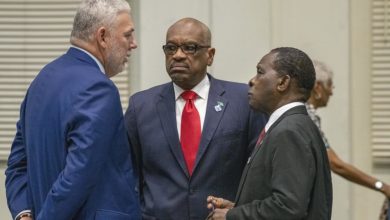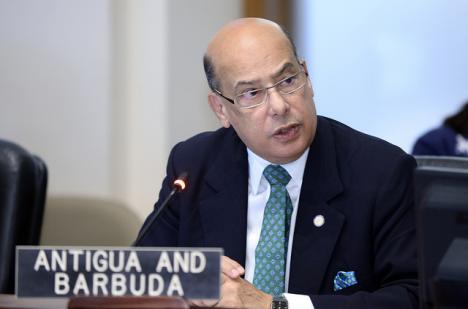Senior representatives of international financial institutions, including the International Monetary Fund and the World Bank, regulatory bodies, the European Union Commission, the OECD Global Forum, commercial banks, central banks, governments the Caribbean Community (CARICOM) Secretariat and the Caribbean Development Bank met in Antigua and Barbuda on 27 and 28 October 2016, under the Chairmanship of the Prime Minister of Antigua and Barbuda, the Honourable Gaston Browne, to seek solutions to the troubling issues of the withdrawal of correspondent relations from Caribbean respondent banks, de-risking and the labelling of the Caribbean as a tax haven.
The outcomes and conclusions of the Conference are as follows:
The provision of correspondent banking services is a lifeline to Caribbean economies without which the region would be excluded from the global finance and trading system with grave consequences for maintenance of financial stability, economic growth, remittance flows and poverty alleviation.
The region would also be prevented from achieving the UN Sustainable Development Goals 2030 with the result that the achievements of Caribbean countries would be reversed and future progress thwarted.
On the eve of the Conference, the Financial Action Task Force (FATF) and the Financial Stability Board (FSB) issued a document that provided guidance for Correspondent Banking Services in which it was stated that withdrawal of correspondent banking relations “is a serious concern” to them “to the extent that de-risking may drive financial transactions into nonregulated channels, reducing transparency of financial flows and creating financial exclusion, thereby increasing exposure to money laundering and terrorist financing risks.”
In this connection, while the withdrawal of correspondent banking relations has grave consequences for Caribbean economies, it also poses serious threats to global financial stability and security.
The Conference welcomed the timely and valuable guidance report from the FATF and the FSB which states that “it is important for correspondent institutions to maintain an ongoing and open dialogue with the respondent institution(s), including helping them understand the correspondent’s anti-money laundering/counter financing of terrorism policy, engaging with them to improve their controls and processes”. The guidance note argues that the process of dialogue and engagement “can help to avoid unnecessary restriction on or termination of a relationship without a thorough assessment of the risks associated with the specific customer”.
The Conference endorsed the FATF-FSB guidance note and welcomed it as a vital platform from which both correspondent and respondent banks can engage in constructive dialogue leading to a permanent solution. In this connection, the Conference called on international banks to continue their provision of correspondent banking relations while all parties implement the guidance of the FATF and the FSB.
Noting that clarity in regulatory expectations is vital to compliance, the Conference also urged acceptance by all regulatory authorities of the FATF Guidance on Correspondent Baking Services, and further encouraged acceptance of the four-point Financial Stability Board’s Action Plan to assess and address the decline in correspondent banking which was presented to G20 Leaders last November.
In this regard, the Conference called on member states of the Organisation for Economic Co-operation and Development (OECD) and the European Union to align their individual transparency criteria in the framework of the Global Forum standards which are approved by 137 jurisdictions.
Caribbean governments, regulators and banks, participating in the Conference, committed the regional jurisdictions to redouble their efforts to achieve full compliance with the international standards set by the FATF, the FSB and the OECD Global Forum. In this respect, the sum of 4.5 million euros pledged by the European Union to Cariforum/CFATF was welcomed by the Conference as a means to address such deficiencies as exist. The Conference urged other countries to follow the lead of the European Union.
With regard to the unfair and unfortunate labelling of the Caribbean as a tax haven, the Conference noted that such labelling is grounded more in perception than reality. Caribbean jurisdictions participating in the Conference resolved to launch a targeted and focussed campaign aimed at eliminating this false characterization. The Conference noted that the Global Forum on Transparency and Exchange of Information for Tax Purposes, which is the global authority on this issue, does not refer to the Caribbean as a tax haven.
Caribbean jurisdictions participating in the Conference acknowledged that some jurisdictions have been tardy in passing legislation for the common reporting standards, and this is a key criterion used by the Global Forum in assessing jurisdictions.
They also agreed that harmonisation of legislation and regulation needs to be pursued. Furthermore, they recognised that efficiencies can be gained from regional collaboration that bundle national operations. They highlighted the fact that the Eastern Caribbean Currency Union countries have decided to consolidate their national AML/CFT work into one regional operation under the purview of the Eastern Caribbean Central Bank.
One of the areas of concern for the international community, is the Caribbean’s perceived lack of enforcement action. It is an issue that must be addressed by dedicating more resources to Financial Intelligence Units and other relevant agencies including the Caribbean Financial Action Task Force to perform their functions more effectively.
The Caribbean jurisdictions agreed that they have to prepare themselves adequately for evaluations by international agencies. This calls for them to establish Frameworks for National Risk Assessments, National Action Plans and National AML/CTF committees, as a matter of urgency to help identify the areas of weakness within their systems, including client information systems. In that regard, data systems have to be improved, and the Action Plan for Statistics approved by their Heads of Government last July should be implemented.
All these initiatives are intended to strengthen the financial reporting systems and provide greater transparency which should raise the level of comfort of correspondent banks.
The Conference agreed that Caribbean banks should also work with correspondent banks to developing pro-forma model agreements which incorporate the principles enshrined in the FATF guidance note as a basis for negotiating the provision of correspondent banking services in the future.
Honourable Gaston Browne, Prime Minister of Antigua and Barbuda
Chairman of the Conference
28 October2016





